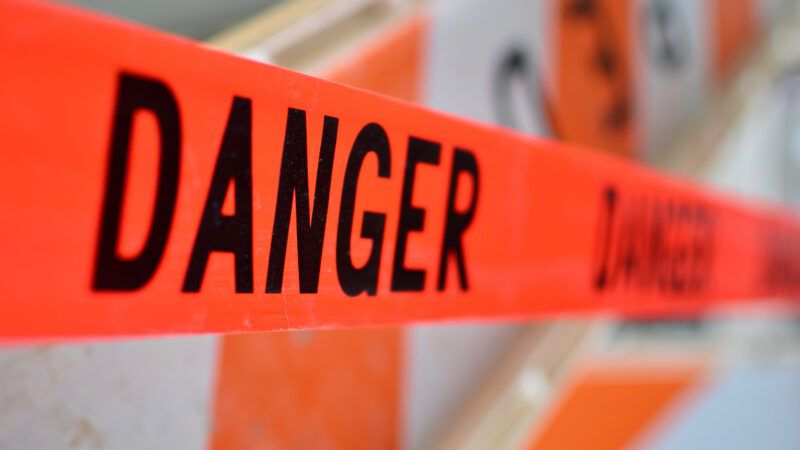Tepid Reopenings Are Producing the Most Absurd Pandemic Regulations Yet
Washington, D.C., policy makers are pairing their very gradual reopening with a series of complicated, confusing, and unworkable regulations.

The most COVID-cautious local and state governments are slowly easing their pandemic-era restrictions. These gradual reopenings, while welcome, are producing increasingly absurd and complicated rules for newly liberated businesses.
Earlier this week, Washington, D.C., Mayor Muriel Bowser issued an order eliminating some restrictions on restaurants, permitting live entertainment, and expanding capacity for retailers and other businesses. Come May 1, District dining rooms be allowed to seat 10 people per table (up from the current six), while restaurants can begin to host live entertainment without first having to obtain a special waiver.
Actual concert halls will also be allowed to reopen at 25 percent capacity or 500 people, whichever is less. Retailers deemed "nonessential" will see their own permitted capacity rise from 25 to 50 percent.
These changes all move D.C., where 33.6 percent of people are at least partially vaccinated, ever so slightly toward a pre-pandemic normal. They also come with a number of carveouts and caveats that will limit their impact.
While individual party sizes at restaurants are increasing, for instance, restaurants' indoor capacity will stay at 25 percent. A midnight curfew for these businesses will remain in place as well.
People seated outdoors will be freed from the requirement to order food with any alcohol. Should you opt to sit inside, however, you will need to buy a snack while you're sipping on your beverage.
The restrictions on newly legal live entertainment come with even more micromanagement.
Bowser's order allows live music for outdoor diners, and for other forms of live entertainment, like comedy or trivia nights, to be performed inside for seated patrons. Indoor live entertainment can't be so loud that patrons would need to raise their voices above a conversational level, per the mayor's order.
The city's Alcoholic Beverage Regulation Administration (ABRA) has concocted more rules still to bring the mayor's orders into effect. Under ABRA regulations, performers must stay six feet away from other performers within a designated "performance area."
That performance area, meanwhile, can hold 10 people if it's inside, or five if it's outdoors. That might help cut down on outdoor noise volumes but would seem to cut against the public health goal of pushing more people and activities into well-ventilated outdoor spaces.
At a minimum, prog rock bands playing outside will be put in the impossible position of choosing between their rhythm guitarist and keyboardist.
All live entertainers must remain masked, per ABRA rules, unless doing so inhibits their ability to perform. Unmasked performers, such as vocalists, trombonists, and harmonica players, however, will have to be 18 feet from seated patrons. Their face-covered bandmates can get as close as 12 feet.
"No dance floors can be constructed or used for dancing," reads ABRA's guidance, which also says that games like pingpong, pinball, and pool will remain prohibited unless they can be played safely by seated patrons.
The problem with D.C.'s approach to reopening is twofold: They're unworkable for businesses that'll have to comply with them, and they're an unsupported, seemingly nonsensical, means of stopping the spread of COVID-19.
"The average commercial townhouse in Washington, D.C., is 20 feet wide," Bill Duggan, owner of Madam's Organ Blues Bar, told me last week, saying that rules governing the space between performers and patrons don't take into account the size of most venues in the city. "Unless I can figure out a way to hang up the three or four people that could fit into that space on the wall, I'm shit out of luck."
Duggan has proposed letting all venues reopen on the condition that performers, staff, and customers all have been vaccinated.
One need not necessarily support "vaccine passports" to at least recognize they're a rational means of ensuring safer environments. One can't say the same thing about District rules that allow you to drink inside only so long as you're eating, or to visit a bar with 10 vaccinated friends, but not 12 of them.
An over-cautious, over-regulated reopening also contributes to the real problem of vaccine hesitancy.
If getting your shot still doesn't allow you to get a shot at the bar (ABRA rules forbid bar seating if someone is working behind it), many will reasonably ask themselves what the benefit of getting vaccinated is.
Rather than try to entice those people with the promise of greater normality and freedom, the District appears to be doing its best to make May 2021 as similar an experience to May 2020 as possible.
Rent Free is a weekly newsletter from Christian Britschgi on urbanism and the fight for less regulation, more housing, more property rights, and more freedom in America's cities.


Show Comments (49)